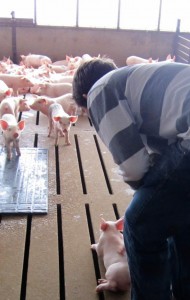Although we can readily see miles of farmland and often times the smell of livestock seems to just roll through Grinnell like a smelly tsunami, the distance from producer to plate seems absurdly great. A recently formed campus group is making tracks in the complete other direction, towards taking “back the right” to self-grown food. In the near future, more and more of the food served in the dining hall will contain ingredients that go one step beyond local, Grinnell Students will have actually raised the food themselves. Nathaniel Powell-Palm ’14 (news editor for the S&B), along with Dining Services, co-founded a group christened the Grinnell Sustainable Agriculture Program (GSAP) which he hopes will act as a platform for students to reconnect with farming, by actually doing it themselves.

While the Dining Hall serves food on a scale nearly incomprehensible to the average diner, according to Powell-Palm, the first step in moving the campus toward greater self-sustainability will be to start raising our own food on a more substantial scale.
“After raising certified organic cattle as well as pigs since I was 12,” said Powell-Palm, “I came to campus with a unique set of skills that I knew I could use during my time as a student at Grinnell. On the second day of my first semester I approached Dining Services, hoping to start a program that would lead to students raising the food they eat in the dining hall. Over the course of about a year of planning, G-SAP has emerged as a program which is both unique amongst our peer institutions and will give students skills for diving deeper into the food movement.”
For their first growing season, G-SAP will purchase four piglets to raise about two miles off campus. The property which the pigs will ultimately call home is the farm of international peace activist and Burling Librarian, Chris Gaunt. Gaunt along with her husband Jay, agreed to give up part of their lawn in addition to a section of their historic barn to the project.
The group plans to meet weekly with their first official meeting this Friday at 7 p.m. in JRC 225. The next day anyone who wishes can go to the farm to help put the finishing touches on the piglets’ home.
On Monday, Sept. 19, the four G-SAP piglets will arrive. And unlike the major production facilities which keep pigs in crowded pens, on slated plastic floors, the G-SAP pigs will be raised with full access to the outdoors and a barn filled with straw bedding.
The following Saturday, Sept. 24, G-SAP will hold the Piglet Welcoming Ceremony at 1:30 p.m. At this time, the entire campus, in addition to the greater Grinnell community is invited to go to the farm to meet the piglets and learn about the program.
“People in America often believe that farming is somehow a menial occupation, something that one wouldn’t aspire to,” said Powell-Palm. “In reality it is one of the most skilled jobs there is. If done right it requires more innovation than many professions, especially with the growing area of sustainable agriculture research.
As a campus institution, G-SAP aims to act as both a club and as a platform for reigniting the conversation about being close to the food you eat.
“The idea is to get people back interested in farming, to give them the opportunity to practice animal husbandry, and bring forth the idea that you can raise your own food and ultimately eat the animals you raise and walk away with a newfound respect for the process,” said Milton Garcia ’14, a member of G-SAP.
While a good deal of work will get done through the efforts of G-SAP volunteers, the project would not be possible with Dick Williams, head of dining services.
“From the first day I approached Dining Services about starting G-SAP, Mr. Williams has not only been the most important supporter of the program, but if it were not for his vision for what G-SAP could be, this club would not exist today,” said Powell-Palm.
Fellow G-SAP member, Kate Munday, ’13 emphasized how essential Dining Services has been and will be to the project.
“The fact that Dining Services is taking such a proactive stance towards helping facilitate a program which will both bring Grinnellian grown food into the dining hall as well as help Grinnnellians develop skills otherwise uncommon to people our age is a testament to how great the possibilities are when students and the administration collaborate,” said Munday.


















































James T. Decker • Sep 24, 2011 at 7:59 pm
Great Idea! I like it…